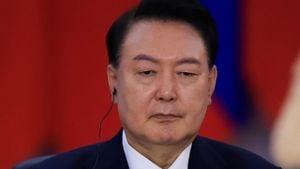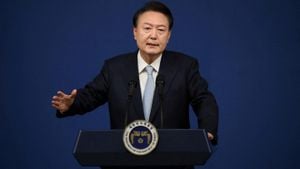The geopolitical chessboard of Europe has witnessed significant tension as Ukraine intensifies its efforts to join NATO amid looming uncertainties surrounding its security guarantees. The backdrop of this strategic maneuvering involves not only Ukraine's aspirations but also the shifting political dynamics within NATO itself and the impending return of Donald Trump to the U.S. presidency. This scenario has heightened the urgency around Ukraine's request for NATO membership, with leaders from Kyiv making it clear they view full accession as the only "real guarantee" for their national security.
According to recent reports from Le Monde, the response to Ukraine's membership bid has been mixed among NATO allies. While notable support from France and the United Kingdom continues, significant reluctance looms from other factions, particularly the United States, Germany, and Hungary. These nations have expressed hesitations, primarily driven by fears of provoking Russia should Ukraine be formally invited to join NATO. This complex interplay of national interests makes Ukraine's path to membership fraught with obstacles and uncertainties.
President Volodymyr Zelenskyy remains resolute, advocating for NATO membership as the best means to deter Russian aggression. He and other officials have articulated their stance emphatically: security guarantees from NATO are non-negotiable for Ukraine if they are to contemplate any cessation of hostilities with Russia. "We believe the only real guarantee of security for Ukraine, as well as a deterrent to Russian aggression, is full membership in NATO," stated Ukraine's foreign ministry.
Meanwhile, at the NATO summit, discussions around Ukraine's bid did not result in solid commitments. U.S. Secretary of State Antony Blinken, during his recent meetings with NATO allies, refrained from indicating any potential policy shift toward Ukraine's membership. His absence of enthusiasm aligns with the views of other key NATO leaders who fear immediate directives might escalate military tensions with Russia.
Notably, tensions around this decision have escalated as Trump, preparing for his possible second term, has suggested he favors rapid negotiation to resolve the war. He has made claims about being able to end Russia's conflict with Ukraine swiftly, though specifics on achieving such objectives remain vague and largely speculative. Concerns rise over whether the U.S.'s approach to Ukraine could drastically shift under his leadership, especially as Trump’s administration previously questioned the U.S.'s level of commitment to NATO.
The reluctance from Germany and the U.S. has not deterred Ukraine’s persistence. German Foreign Minister Annalena Baerbock articulated the need for genuine security guarantees which would enable credible peace talks. “We're discussing this intensively,” she remarked, underlining the anxiety over the potential upheaval with the incoming leadership. Alongside this, Luxembourg’s Foreign Minister, Xavier Bettel, issued caution about the repercussions tied to Ukraine’s NATO membership, warning it could rekindle old tensions and prompt fresh conflicts.
This diplomatic tightrope is paralleled by Ukraine’s military struggles on the ground. Reports indicate Ukrainian forces face increasing pressure on the eastern front as Russian troops continue their relentless offensive. Just recently, Russia claimed territorial gains, capturing additional villages and pushing forward, forcing Ukraine to invest heavily not just militarily but diplomatically. The country's strategy on claiming more weaponry from its allies indicates the sense of urgency felt by Ukrainian leadership.
Interestingly, amid the discussions, proposals of deploying European troops emerged, focusing on reinforcing ceasefire agreements should they ever come to fruition. This indicates the growing consensus on the necessity to plan not just for the current crisis, but for the eventualities of peace and stability thereafter. If anything, this symbolizes the complexity of managing military and political dimensions simultaneously.
Back on the political front, Kyiv is scrambling to fortify its position before Trump’s inauguration, fearing potential shifts in U.S. foreign policy. Recently, the Biden administration announced new military assistance to Ukraine, including a substantial package of $725 million, as allies step up their support. Nonetheless, Ukraine's needs evolve daily; they’ve made urgent calls for advanced air defense systems and other weaponry to counter the latest Russian technology, like the experimental Oreshnik missile, which has heightened the stakes of the conflict.
While Ukraine's NATO membership aspirations hang by a thread, the international community watches closely, and the interplay of support, hesitance, and political maneuvering holds immense significance for future relations and security within the region. The broader narrative of Ukraine's NATO engagement is probably more than just about security; it encapsulates fundamental questions of sovereignty, alliances, and the stability of European security architecture.



